
By its definition in existential philosophy, what we call the ‘absurd’ is a contradiction found between a contrast; it is the impenetrable brick wall we run into in our search to find inherent meaning and significance in a world that lacks it. In his 1942 “Le Mythe de Sisyphe”, French philosopher and writer Albert Camus compared the human condition with the punishment received by Sisyphus.
According to the Greek myth, Sisyphus tried to escape death by deceiving Hades. When he was dragged back to hell, he was forced to roll a huge rock up the steep slope of a mountain; however, the rock would always slip from his hands just before he reached the top, and thus he would need to start from the beginning. And just like him, we are forced to carry the weight of our meaningless and godless existence, only to see all of our efforts fall apart, forcing us to start over and over and over.
Absurdism was widely explored in arts and literature during the 20th century, and it is deeply embedded in the existentialist movement. Prominent writers such as the aforementioned Camus, Samuel Beckett, Fyodor Dostoyevsky, and Franz Kafka made wide use of it in their philosophical investigations, pondering subjects like social life, identity, God and religion, madness, depression, and many more.
In fiction, it manifests as narratives in which its characters are faced with the need to find meaning in meaningless situations. While the word ‘absurd’ might at first evoke an image of comedy, it isn’t necessarily comical. It goes from the ridiculous to the sublime, from a heartwarming comedy to a gut-wrenching tragedy, exploiting a wide array of feelings and situations in which the lack of answers and purposes loom over us as if it were a bird of prey.
Here are 15 films that resort to satire, dark humor, tragedy, comedy, hyperbole, and many other storytelling motifs to shed a light into the matter of the absurd, of our relentless and, most of the time, fruitless search for realization and understanding.
1. Zelig (Woody Allen, 1983)

If there is any Woody Allen film worth watching, it has to be “Zelig”. Directed in 1983 and starring Mia Farrow and Allen himself, it tells the story of Leonard Zelig, a man whose shyness and social ineptitude are so huge that they force him to inadvertently personify whoever is around him in order to blend in.
While Allen plays himself in many of his pseudo-intellectual New York films, emphasizing his social anxiety and inability to fit in, in “Zelig” he goes deeper, making a satire out of his introspective traits.
With a solid sense of comedy, this film takes the form a faux documentary to tell the story of a man whose life is the epitome of the desire to blend in and to be accepted that many introverts grow and develop. By extrapolating his chameleonic self-mockery up to an almost literal point, he manages to make a point about identity, about how important it is to find our own identity, and how it defines our relationships with others and with the world.
2. Songs from the Second Floor (Roy Andersson, 2000)
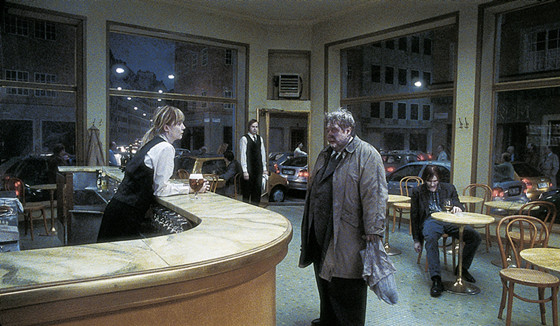
“Songs from the Second Floor” is a genius poem by Swedish filmmaker Roy Andersson, in which we take a walk throughout many of the complications and pleasures of the human condition. It is part of what is known as Andersson’s “Living Trilogy”, in which we can also find “You, the Living” (2007) and “A Pigeon Sat on a Branch Reflecting on Existence” (2014).
While his compatriot Ingmar Bergman has a dark take on existentialism, expressed in his deep psychological dramas plagued with depressed and anxious characters and the constant dread of death and insanity, Andersson prefers to go with comedy, assuming life as laugh-inspiring and never-endingly absurd.
Inspired by Peruvian poet Cesar Vallejo, this films talks about compassion, love, and pain. It’s a caress, a hug, a love letter to those who have been wounded by life. It is an invitation to carry on.
3. Life of Brian (Terry Jones, 1979)
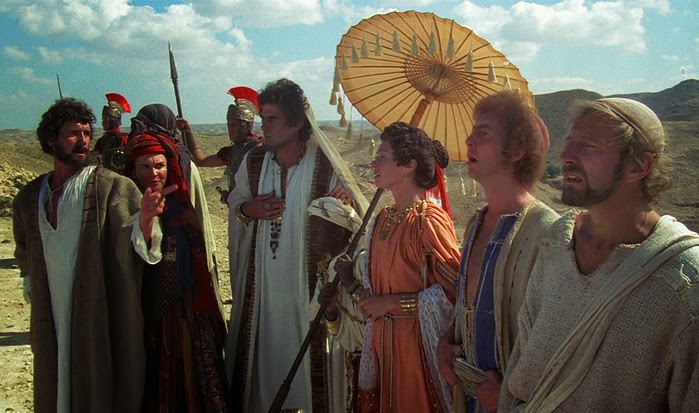
Out of all the Monty Python films, “Life of Brian” is the one that stands out the best. It is a clever comedy that satirizes on the tale of Christ. Brian is the protagonist of the story, a young man who was born on the same day as the Messiah, and who is repeatedly mistaken for a prophet.
With the Monty Python’s trademark silly comedic style, the film makes a point on the ridiculousness of organized religion, and the desperate situations we have to face when we run into religion out of fear of loneliness and meaninglessness.
The films ends with a quite uplifting song, but it makes a solid point. Being alive might suck, our expectations are probably never going to be met, we’re all going to suffer, dissatisfaction will follow us everywhere, and death has been staring at us since the day we are born – but if we look at the bright side of life, we might enjoy it for a while.
4. Closely Watched Trains (Jiří Menzel, 1966)
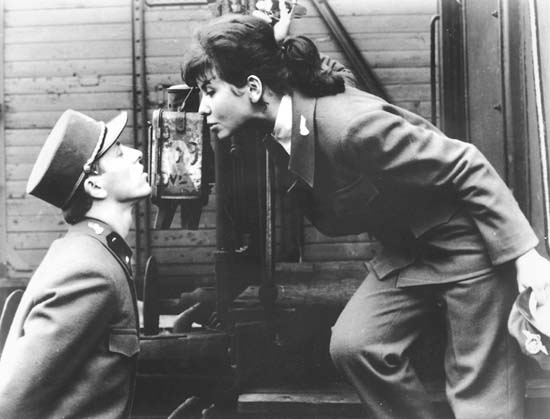
A young man who is just coming of age at his first job at his local railroad station is the protagonist of Jiří Menzel’s “Closely Watched Trains”. The film is inscribed into what we know today as the Czechoslovak New Wave, a period in which Czech cinema redefined itself through experimentation.
Tired of the ways of the communist regime, the young directors of the wave (among whom we can find Miloš Forman, Věra Chytilová, and the aforementioned Menzel) sought to bring a freshness and passion to cinema that was absent from the social-realist forms of art imposed by the communist regime.
In this complex Oscar-winning comedy, Milos, our protagonist, faces the reality of sex for the first time in his life. It is set during World War II, during the German occupation of Czechoslovakia, but instead of war, what we see is the unfolding of the sexual nature of the characters who populate the train station.
The vast reality of the human condition is reduced to the sexual imperative, where the happenings of the world are just a background for our sexual developments and desires.
5. Dr. Strangelove or: How I Learned to Stop Worrying and Love the Bomb (Stanley Kubrick, 1964)

“Dr. Strangelove” is a film that inspires strangeness right from the moment you read its ridiculously long title. Released in 1964, the film is set during the Cold War and reveals the absurd nature of armed conflicts through a satirization.
A paranoid American army general, convinced that the Russians are contaminating the potable water in the United States, decides to act on his own and puts in motion the mechanisms that would lead to a nuclear holocaust.
In its heart, this film is a study into the nature of human violence. If “Paths of Glory” shows war in a crude way, focusing on its moral implications and portraying the horror and suffering of the trenches, “Dr. Strangelove” is concerned with the derangement of those who call the shots. War is seen as a strategic game, no less abstract or intellectual than other games like chess or checkers, or at least it is for those who play it inside the War Rooms.
6. Synecdoche, New York (Charlie Kaufman, 2008)
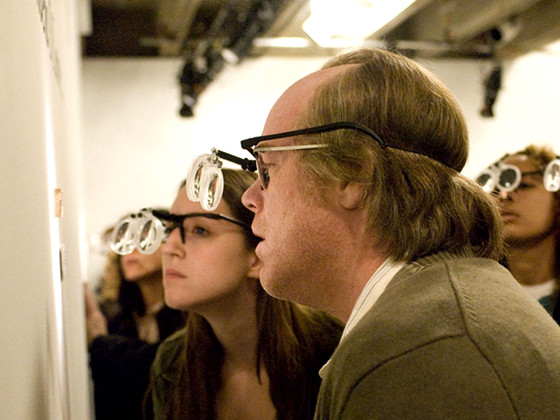
While Charlie Kaufman gained notoriety and praise thanks to “Being John Malkovich” and “Eternal Sunshine of the Spotless Mind”, “Synecdoche, New York” is probably the most complex and far reaching work in his filmography thus far.
It is a rich and populated drama where Philip Seymour Hoffman plays Caden Cotard, a theatre director who starts working on a live replica of New York City inside a warehouse. Set as the ultimate search for truth, the play serves as a mirror in which Caden can witness the unraveling of his own life.
While delving into deep existentialist themes, Kaufman still manages to slip a laugh here and there, albeit with a very dark and twisted sense of humor. Changing genres seamlessly, going from silly screwball comedy to soul-crushing existential drama with great ease, “Synecdoche, New York” is a complicated film to watch; it might make you reevaluate your entire life, or it might make you look in the mirror, where a nasty image awaits you.
Death is everywhere in this film, and it always comes unexpectedly, just as in life, so we may just as well enjoy our stay in this world while it lasts, instead of obsessively trying to find answers that aren’t there, or to wait for a salvation that will never come. It’s an invitation to create something beautiful.
7. The Exterminating Angel (Luis Buñuel, 1962)
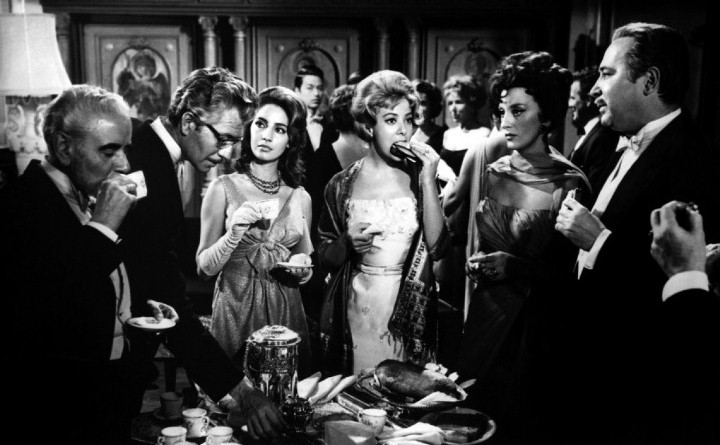
This 1962 masterpiece from Luis Buñuel stands to this day as the paragon for surrealist cinema. In Mexico City, a group of bourgeois people meet in a mansion to have dinner.
After the evening is done, they all very politely say their goodbyes and decide to part; except, when they try to leave of the dining room, they are inexplicably frozen in place, unable to go past the room’s threshold.
The film criticizes the hypocrisy and the double-standard morals underlying in the upper-class mentality, and that today can be found in the middle classes as well. After they all come to accept their unexpectedly reclusive lives established inside the room, they try to maintain their dignity and status, though eventually their social facades fade away, revealing their raw animal nature.
The negation of our instincts is exposed; sex, survival, and territory become the main concerns of the attendants of the dinner as time passes and the situation becomes desperate due to the lack of logical answers.